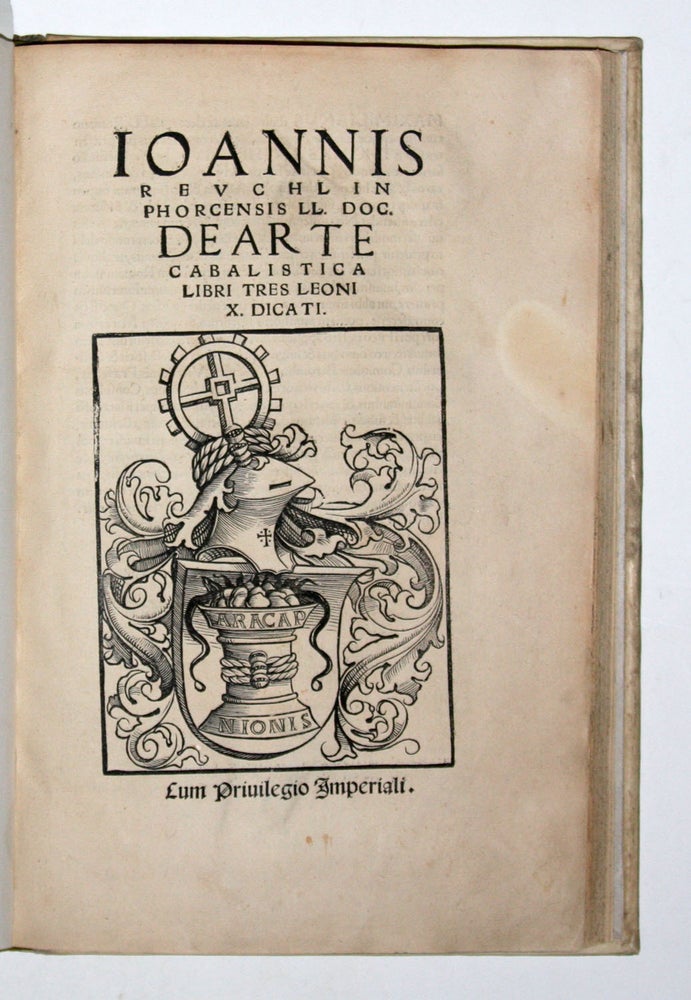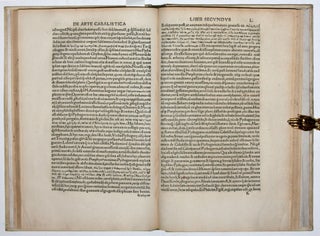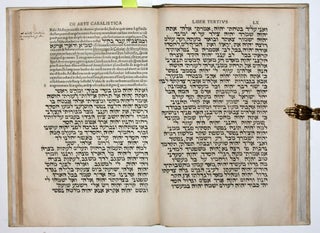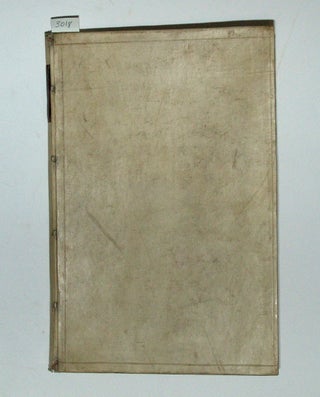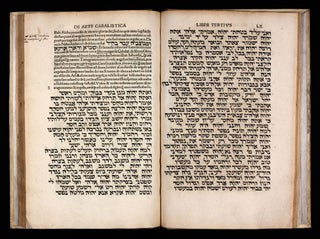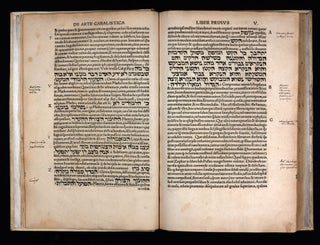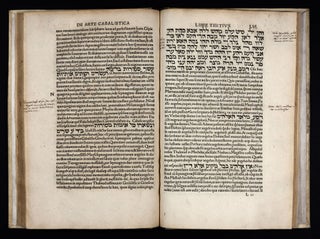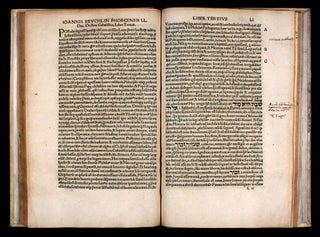De Arte Cabalistica Libri Tres.
Small folio [29.5 x 18.5 cm], Small folio [29.5 x 18.5 cm], (4), 79 (1) ff., including author’s woodcut arms on title as well as numerous passages of Hebrew and Greek, with several woodcut Cabbalistic figures. Bound in 17th-century stiff vellum, calf title label gilt. Numerous annotations in a 17th/18th hand, occasionally cropped presumably at the time of binding. Ownership inscription of “D. Wyttenbach”, probably philologist Daniel Albert Wyttenbach, dated 1786 on front endleaf, and an additional note “Bought of Payne & Foss, 1824” in ink below; discrete 19th century stamp of the Ochsenhausen Abbey library in southern Germany on verso of the final leaf. Apart from even toning a fresh, unsophisticated copy, excellent. First edition of the first major work of Christian Cabalism by the German humanist and scholar of Greek and Hebrew Johann Reuchlin, introducing the Cabala to the Christian Renaissance. Contrary to many of his contemporaries, who thought that the first step in the conversion of the Jews was to confiscate their books, Reuchlin felt the Cabala might be of service for the defense of Christianity and the reconciliation of science with the mysteries of faith. Through his interest in Cabala, Reuchlin became one of the foremost Hebraists of his time, and through his widely-read De arte cabalistica, he fomented a wider European interest in Hebrew philology. “One of the leading Greek scholars of his day, Reuchlin first tried to study Hebrew in Paris (1473) and is said to have learned the Hebrew alphabet from a Jew named Calman in 1486. Another of his early teachers is thought to have been the convert Flavius Mithridates” (Scholem). Reuchlin’s principal interest was in the application of Cabala as a source of Christian revelation, with particular emphasis on numerology and the hidden meaning of Hebrew letters. De arte cabalistica, his major work on the subject, is a Socratic-style dialogue set in Frankfurt. The interlocutors are Philolaus (a Pythagorean), Marranus (a Muslim), and Simon (a Jew). Simon, an exile of the 1492 Spanish expulsion, teaches the others at great length about the Cabala and its numerological mysteries. These mysteries Reuchlin uses to seek evidence of Christian revelation in Hebrew passages. In a culture of widespread, often virulent anti-Semitism, both the content of De arte cabalistica and the form of presentation, in which a non-converted Jew teaches his fellows about Hebrew scholarship, suggests remarkable tolerance for the period. After meeting Giovanni Pico della Mirandola (1463-1494) in Florence in 1490, Johannes Reuchlin (1455-1522) became “Pico’s most important follower” (Karr) and inaugurated the tradition of Northern European interest in Hebrew. Although one or two medievalists had managed to translate Hebrew fragments of the Bible, Pico and Reuchlin actively sought out Jewish exegetical texts such as the works of David Kimhi. Several dozen Jewish sources, especially the Zohar and works by Joseph Gikatilla, are cited in De Arte Cabalistica, which follows from both Reuchlin’s earlier introduction to Cabala (1494) and his groundbreaking De Rudimentis Hebraicis, the first comprehensive Hebrew grammar prepared by a Christian. Frances Yates finds in Reuchlin an early figurehead of the new learning (humanism), and most significantly, a German. “If one were to look for Renaissance Neoplatonism at its most intense one would find it in the De arte cabalistica of Johannes Reuchlin published in 1517. Reuchlin had acquired his interest in Cabala in Italy and was a disciple of Pico… His De arte cabalistica is the first systematic treatise on the subject by a non-Jew, and it is by a German. Cabala has moved to the north, and is beginning its connection with the German Reformation… Renaissance Neoplatonism takes a new turn with Reuchlin, a turn towards reformation and the north, and with greatly increased emphasis on Cabala” (The Occult Philosophy in the Elizabethan Age, p. 5). Reuchlin became embroiled in scandal in 1510 when he refused to support the seizure of all Jewish books in Christian lands. According to Yates, Reuchlin’s bold defense of Hebrew learning in defiance of more conservative Catholics, and the support that he initially drew from figures such as Luther, prefigured Luther’s opening salvo of the Reformation. Published on the very eve of the Reformation—later that same year Reuchlin would receive a copy of Luther’s 95 theses—the present work is judiciously dedicated to Pope Leo X and bravely advocates the value of Hebrew scholarship to Christianity in its preface. “The opposition which [Reuchlin’s] commitment to Hebrew studies, and to the cause of the Jews, encountered illustrates the degree of prejudice which still had to be overcome. But it was thanks to Reuchlin that Christian Hebraism spread beyond the Italian borders and, owing to an even wider group of practitioners, starting with Sebastian Münster in Basel, improved in the course of the sixteenth century” (Alastair Hamilton in The Cambridge Companion to Renaissance Humanism, p. 106).
* Adams R-381; Proctor 11,685; Benzing (Reuchlin) 99; Caillet 9333; G. Scholem, Kabbalah, p. 198; cf also D. Karr, The Study of Christian Cabala in English, p. 6; and S. A. Hirsch, “Johann Reuchlin, The Father of the Study of Hebrew among Christians” in A Book of Essays (1905).
Price: $15,000.00

